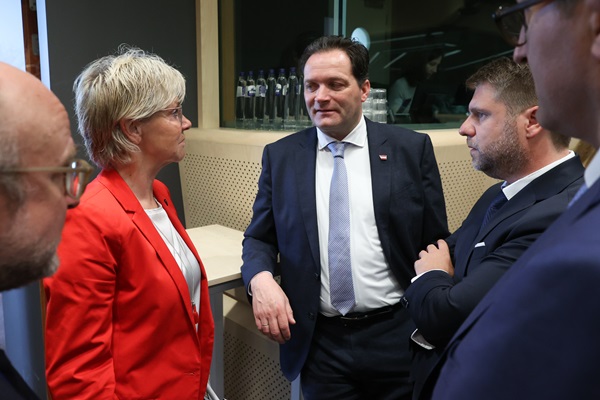 Credit: European Union
Credit: European Union
On Monday 27 May 2024, Luxembourg’s Minister of Agriculture, Food and Viticulture, Martine Hansen, participated in the Agriculture and Fisheries Council in Brussels.
Ministers took stock of the responses provided to the sector to resolve the current agricultural crisis. Minister Hansen reiterated that the administrative simplification of the common agricultural policy must be done according to the pragmatic “need to have” approach at the expense of “nice to have”.
According to the Ministry of Agriculture, Food and Viticulture, the minister spoke out against the obligatory use of geo-referenced photos and the recurring adaptations of the annual common agricultural policy (CAP) performance framework that is too burdensome for administrations. To improve risk management, Minister Hansen proposed preventive measures such as innovative production and crop rotation techniques resilient to extreme weather situations, integrated management of alerts relating to crop and livestock diseases, as well as better management some water.
The minister highlighted that Luxembourg encourages and subsidises farmers who take out insurance against insurable risks, but with natural calamities becoming more and more frequent, the agricultural reserve will have to play a crucial role in European solidarity.
The Council analysed the situation of agricultural markets. Although the price level of agricultural products has stabilised, production costs are weighing on farmers' margins. “The agricultural sector remains the weak link in the food chain. We must strengthen the position of farmers in our food chain by diversifying agricultural production, increasing the supply of plant proteins, innovating and improving strategic autonomy in nitrogen fertilisers,” said Minister Hansen.
Recent unfavourable weather conditions such as heavy rains in Luxembourg and drought in Cyprus risk weighing on certain agricultural yields, depending on the region, the ministry noted. According to Martine Hansen, it is too early to take stock of major agricultural crops, but it is obvious that the abundance of rain has delayed winter and spring sowing as well as the first forage cuttings in certain regions. Late frosts and bad weather have impacted vineyards and certain fruit productions, and an impact assessment among producers is underway in the Grand Duchy.
During the debates on origin labelling on agricultural products, Minister Hansen pleaded for voluntary origin labelling or regional labelling, which corresponds to consumers' demand to eat locally. Indeed, in Luxembourg, cross-border exchanges of limited volumes (notably of milk) are common practice and compulsory labelling of origin, based on the country's name, would pose a problem for Luxembourg's agriculture and agri-food sector.
Finally, during discussions on the place of animal welfare in the agenda of the next European Commission, Martine Hansen called for a high level of animal welfare standards in European agriculture. Luxembourg is in favour of limiting the maximum duration of transport of animals in Europe, a ban on exports of live animals to slaughterhouses located in third countries and stricter regulation of the trade in dogs and cats, the ministry concluded.








